Cyclone Nargis claimed 85,000 lives in Myanmar, formerly known as Burma, when it struck in the first few days of May. Another 50,000 are still missing. Barely two weeks later, an earthquake in China’s Sichuan Province killed 70,000 people and left another 18,000 missing.
The Chinese government responded quickly and welcomed help from foreign disaster relief teams. The response of the Myanmar government could hardly have been more different. Foreign disaster teams were not allowed to enter the country for about two weeks. Obstacles were put in the way of Burmese nongovernmental organizations (NGOs) and individuals who tried to provide assistance to victims. The callous attitude of the Myanmar government was so great that prominent government and NGO leaders around the world called for “nonconsensual” intervention.
Few Americans seem to understand that the military officers ruling Myanmar have a genuine fear of a U.S. invasion, greatly reinforced in 2003 when the U.S.-led coalition toppled Saddam Hussein’s government. Cyclone Nargis appeared to provide a perfect opening for a similar operation in Myanmar. After all, the United States has been conducting annual military exercises with neighboring Thailand, historically the great enemy of Myanmar. Even last year’s gratuitously violent film “Rambo IV” elevated concerns about intervention by Americans.
While the impact of the cyclone has been devastating for thousands of families, the underlying reality is that Myanmar’s 50 million citizens have been deprived of many benefits of modern life by wrongheaded economic policies for more than 45 years. Myanmar has one of the world’s worst health systems. Its public education system is in shambles. More than 2 million have emigrated to seek refuge or jobs.
Myanmar appears to be on an unsustainable path, but is not caught in the kind of death spiral that seems to be occurring in Zimbabwe. While inflation is high, socially destructive hyperinflation is unlikely due to the revenue windfall from its exported gas. Investment is positive and the economy is growing, albeit hugely below its potential.
The sticks of Western sanctions have had no discernible impact on the regime’s ability to rule, and the occasional carrots of support have either been tainted in the eyes of the generals. The “constructive engagement” policy adopted by Myanmar’s partners in the Association of Southeast Asian Nations (ASEAN) community has also not moved Myanmar onto the path of economic growth that has brought prosperity to other Asian nations.
Myanmar’s military government has ruled in virtual isolation from the world for two generations, since a coup in 1962. It controls enough natural resources to ensure its survival for decades. It also has important friends and business partners – especially in Thailand, China, and India.
The May referendum on a new constitution shows the military’s grip on power remains strong: 99 percent of the registered voters participated and 92.4 percent voted in favor of it. Multiparty elections are set for 2010, but the democratic opposition stands no chance of emerging victorious, as it did in the 1990 vote.
Supporters of Aung San Suu Kyi, the opposition leader and Nobel laureate who remains under house arrest, have called on the governments of the United States and the United Kingdom to take the lead in fixing Myanmar. It is ludicrous, however, to expect these two countries to play leadership roles in any process of dialogue as long as they cling to their dogmatic policies toward the military rulers of Myanmar. It is also wildly unrealistic to expect the United Nations to leverage any meaningful policy changes.
The best hope for efforts that might lead to tangible improvements in the daily lives of the citizens of Myanmar is probably ASEAN. The 10 ASEAN member countries adopted a new charter last year, which is due to be ratified by November 2008. The charter has a weak human-rights provision, but it will provide a stronger basis for dialogue with the Myanmar government in this sensitive area.
Observers rightly complain about the military regime’s inflexibility, but much of the opposition is equally inflexible. A fresh policy debate could identify approaches more likely to lead to positive change for the long-suffering people of Myanmar. Five principles could improve the odds of success under the next administration.
- First, refer to the country as Myanmar instead of Burma. Governments have the prerogative to change their names. The ASEAN members and other Asian nations stopped using Burma long ago. By insisting on calling the country Burma, the U.S. government is openly insulting the military regime and disrespecting the views of Myanmar’s Asian neighbors.
- Follow ASEAN’s lead. One way is to sign the ASEAN Treaty of Amity and Cooperation, the foundation for ASEAN’s relations with other countries. Others include visibly supporting ratification of the ASEAN charter and strongly supporting the ASEAN Regional Forum as the first place for the international community to discuss the difficulties associated with Myanmar.
- Accept that the military will play a critical role in Myanmar for another generation or two. The successor to aging Gen. Than Shwe will have more political space for reform if he does not feel threatened by external powers.
- Support preparations for eventual policy reforms. Technical skills to plan and implement sound policies are appallingly thin in Myanmar. They can be improved through ASEAN-based training programs and scholarships for study in the United States and elsewhere.
- Stop blocking the World Bank and the Asian Development Bank from working in Myanmar if it takes meaningful steps to meet ASEAN standards of transparency and governance.
Much more can be done, under the radar, through private sector and people-to-people activities, to nudge Myanmar toward a brighter future. At the level of government policy, quietly supporting Asian initiatives is more likely to advance broader U.S. objectives in Asia than waving our big stick and speaking loudly.
The Brookings Institution is committed to quality, independence, and impact.
We are supported by a diverse array of funders. In line with our values and policies, each Brookings publication represents the sole views of its author(s).
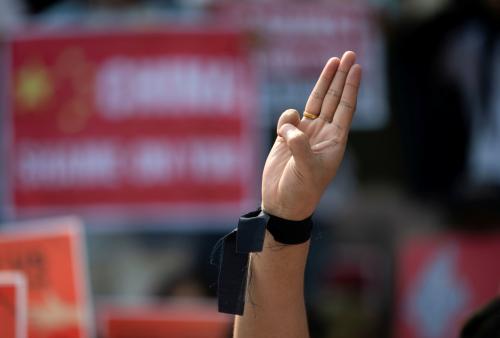

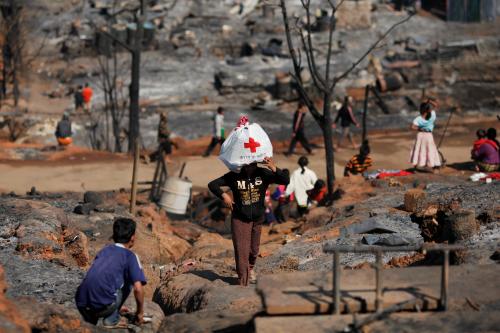
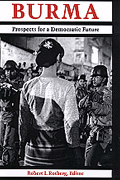
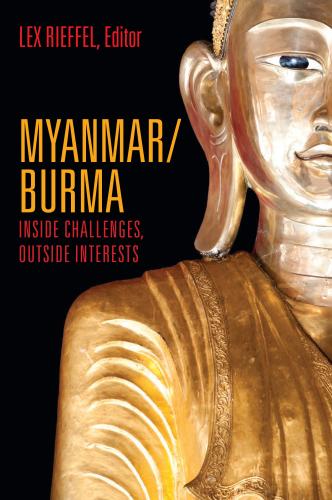
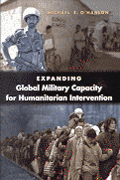




Commentary
Op-edMyanmar: Where Do We Go From Here?
August 3, 2008